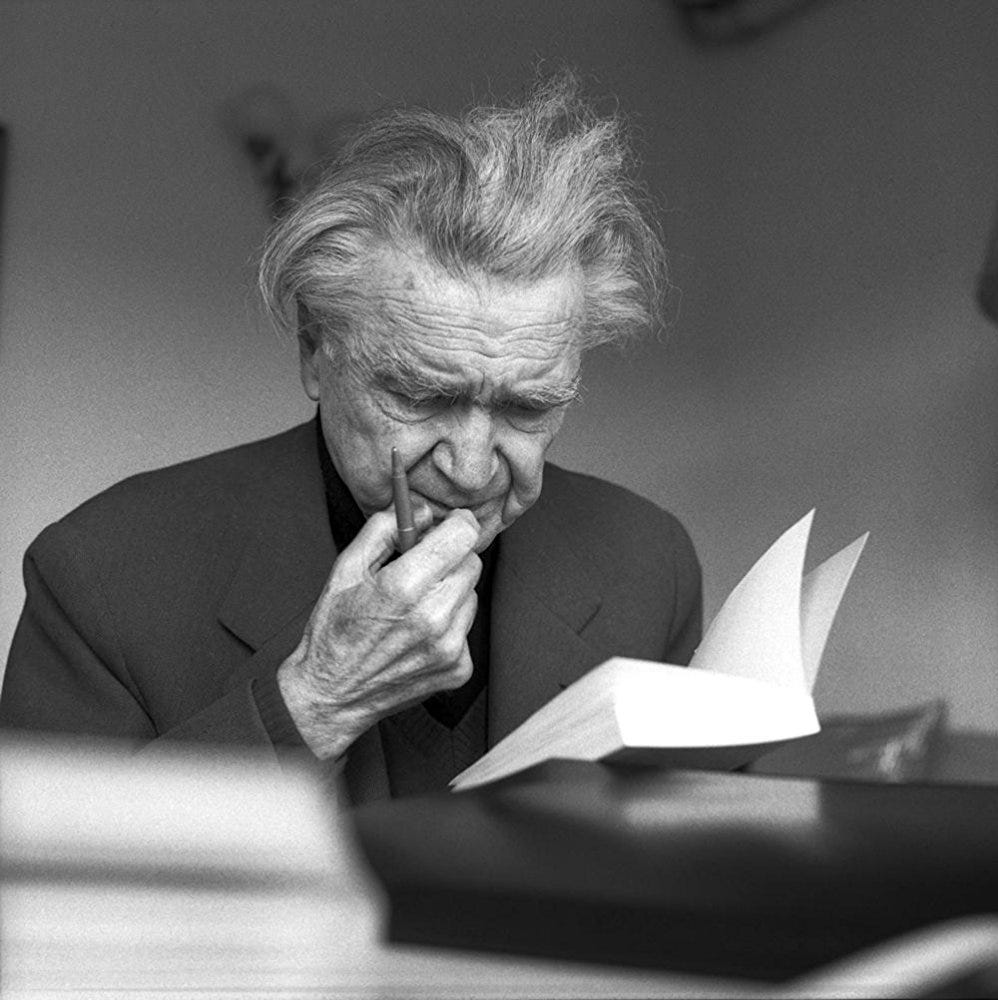Latest news about Bitcoin and all cryptocurrencies. Your daily crypto news habit.
 Photo from Unsplash
Photo from Unsplash
The ideas of existentialist philosophers all have something to teach us about how to think about, and deal with, anxiety.
The philosophers I will cover in this essay are Emil Cioran and Søren Kierkegaard, who provide incredibly unique and acute insight into the topic of anxiety.
Have you ever felt anxious, that feeling of a knot in your stomach, palms sweaty, and thought to yourself, “there’s absolutely no reason for me to be anxious right now”? Or perhaps you’ve felt anxious, but recognized that logically having anxiety at the moment does not make sense. Or perhaps — as other people do with anxiety — they feel anxiety and think to themselves “I am anxious because of X”, where X is some event, person, or thing that they believe causes them to worry.
How Emil Cioran Views Anxiety
Emil Cioran, a Romanian existentialist philosopher and essayist, addresses the issue of people feeling anxiety for no logical reason. Cioran’s writing mainly focuses on suffering, decay, and nihilism within our lives and how to confront it.
If that sounds incredibly morose, that’s because it is — Cioran is known for popularizing the idea of “philosophical pessimism”, he wrote a book called The Trouble With Being Born, and his mother was so distraught with her son’s unhappiness that she told him “If I had known [how unhappy you’d be], I would have had an abortion”.
Given Cioran’s background, one might find it unlikely to think that he has anything useful to say about anxiety. And yet, his writing has been incredibly helpful in allowing me to understand the nuances of anxiety more thoroughly. On how anxiety is brought about, Cioran writes in his book The Trouble With Being Born:
“Anxiety is not provoked: it tries to find a justification for itself, and in order to do so seizes upon anything, the vilest pretexts, to which it clings once it has invented them. . . . Anxiety provokes itself, engenders itself, it is “infinite creation.”
Anxiety is not something that is necessarily caused for any particular reason but is something that often simply occurs. It’s only after we feel the knot in our stomach that we begin to come up with reasons as to why we are experiencing with anxiety. In this process, we may point to events and people “causing” our anxiety, tell ourselves that’s why we are feeling anxious, and that can cause us to feel even more anxious.
The first step in dealing with anxiety is to recognize the following: Anxiety does not have to necessarily be caused by something to occur, or be based in reality. Feeling anxious does not mean there’s something wrong in your life.
Once you realize that anxiety is solely something you feel, and is not an indication of who you are as a person, that realization will help you to let go of worrying about anxiety so much.
Cioran also calls anxiety “Fanaticism of the worst”. This is in line with his previous quote I mentioned, the idea that when we have a feeling of anxiety we will focus on the worst aspects of life in an effort to justify feeling anxious. Anxiety causes people to literally become fanatics of the worst aspects of life, and ignoring the positive and good aspects of life. In order to escape this aggressive anxiety cycle, it necessary to stop focusing on the worst things that can happen in a situation and begin to focus on the potential upside and positives in a situation.
Introspection, Psychotherapy, And Self-Reflection Can Help With Anxiety

Many people simply try to medicate their anxiety away with prescription drugs instead of attempting to perform some introspection or psychotherapy to discover why they are anxious and lessen the symptoms. I think this causes a huge disservice to people who are feeling anxiety.
I want to be perfectly clear here — I’m not advocating that everybody with anxiety stop using prescription drugs. There are legitimate instances in which prescription drugs can reduce anxiety symptoms and are the only solution that actually works. But there are also many instances in which there is underlying psychological trauma and personal issues that causes the anxiety that are never addressed. In some cases, using prescription drugs to reduce anxiety only masks the symptoms and doesn’t address the root cause of the anxiety.
For people who have anxiety, I’d recommend to them to include some introspection, self-reflection, and psychotherapy as a way to treat anxiety in addition to what they are already doing. The existentialists were huge advocates of self-reflection and introspection. This means putting aside an hour or so to really focus on yourself and your past, and potential causes for your anxiety. Introspection and psychotherapy can help you understand the underlying causes of anxiety within you. Once you understand the root cause of the anxiety, you can begin to address it and remove the anxiety.
Perhaps when you do some introspection, you realize that the anxiety you feel today is partly a result of low self-esteem that you got at a young age because you were never encouraged — and that low self-esteem continues to this day.
You can then begin to address the issues of low self-esteem through a variety of ways — for example, by surrounding yourself with more positive and encouraging people. Or trying meditation and therapy. When the underlying cause of anxiety is resolved, you will find that not only will instances in which you feel anxiety lessen but other aspects of your life will also improve.
Trying To Remove Anxiety Completely Is The Wrong Goal

Many people with anxiety may try to focus figuring out ways to completely eliminate the feeling of anxiety that they have, but this might not even be the correct goal.
Kierkegaard, a Danish philosopher who is widely considered by many to be the first existentialist, once described anxiety as the “dizziness of freedom, which emerges when the spirit wants to posit the synthesis and freedom looks down into its own possibility, laying hold of finiteness to support itself”.
That is to say, it is only through experiencing anxiety do we understand that we are free beings with the freedom to make our own choices. The possibilities can be endless — and dizzying, as a result.
For example, if a person were to stand on top of a very tall building he would most likely feel anxiety. This is because he knows there is the possibility that he could jump or fall off the building. It’s not that he actually will jump — but simply the possibility of it gives rise to anxiety.
Kierkegaard believed that anxiety helps us begin to know ourselves, and the multitude of choices and possibilities we face. Anxiety means we’ve chosen ourselves. He also believed that anxiety helps us secure our identities as individuals that are unique from the crowd. Individuals are anxious about different events and items — they do not always become anxious at the exact same things. Anxiety reveals our existence as true individuals.
So is removing anxiety completely a good thing? Not necessarily. Anxiety helps to show us who we truly are and shows us that we are unique individuals. To remove anxiety would mean to remove our individuality.
Kierkegaard wrote: “Anxiety . . . is an expression of the perfection of human nature. It is the homesickness of earthly life for the higher.” That is to say, we also experience anxiety when we recognize that we’re not who we could be. Although it’s a difficult thing to admit at first, there’s promise in understanding this because it means that we know that there are ways to self improve and become a better person. Kierkegaard writes:
“Deepest within every person there is nonetheless an anxiety about being alone in the world, forgotten by God, overlooked among the millions and millions in this enormous household. People keep this anxiety at bay by looking at the many people around them, who are related to them as family and friend; . . . one scarcely dare think about how one would feel if all these were taken away”
In this way, anxiety actually represents the perfection and idealism of human nature. That we want to be recognized by others. Anxiety shows us that we always want striving for more, that we are striving for greater things that are just beyond the horizon that we can’t see but know is there.
You should not fear anxiety. I know I don’t. Your goal in life should not be to eliminate anxiety entirely, but to become an authentic human being that acts in accordance with who you actually are in spite of anxiety. You should fear becoming an empty, hollow individual that is indistinguishable from others and not becoming the person you know you could become.
Kierkegaard said that for those who do not experience anxiety, “that is because he is spiritless.” Above all, anxiety is a reflection of the human spirit’s desire for perfection and reaching the greatest heights. It is the desire to remove suffering and problems from our lives. Extreme anxiety can be debilitating — but no anxiety can be just as bad.
In Conclusion
Act despite the anxiety and fear that you may feel. You might not be able to eliminate anxiety entirely, but you shouldn’t want to anyway. You should try to become your authentic self.
This article was originally published in The Ascent.
If you liked this article, give it 50 claps!
What Existentialism Can Teach Us About Dealing With Anxiety was originally published in Hacker Noon on Medium, where people are continuing the conversation by highlighting and responding to this story.
Disclaimer
The views and opinions expressed in this article are solely those of the authors and do not reflect the views of Bitcoin Insider. Every investment and trading move involves risk - this is especially true for cryptocurrencies given their volatility. We strongly advise our readers to conduct their own research when making a decision.
